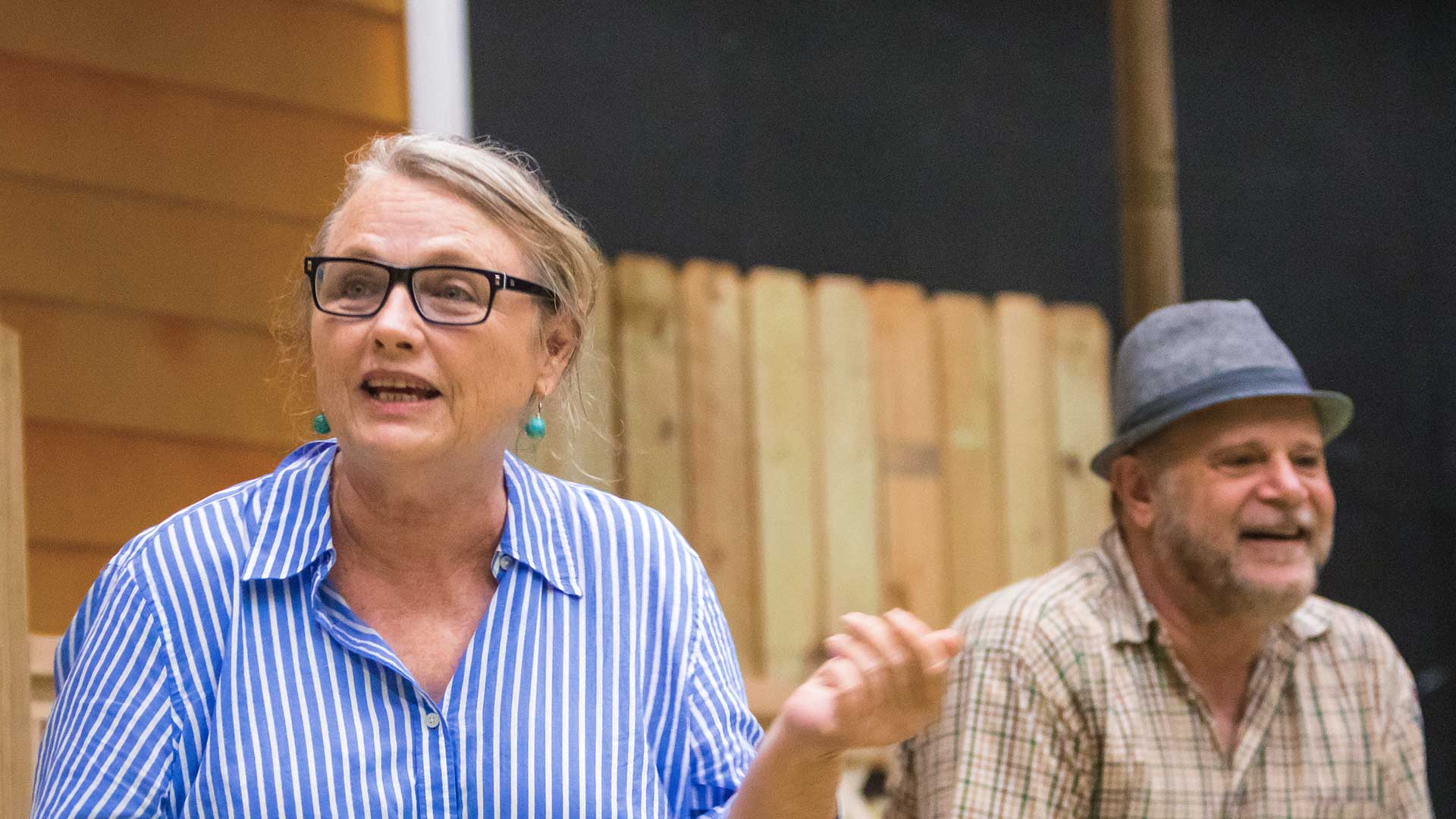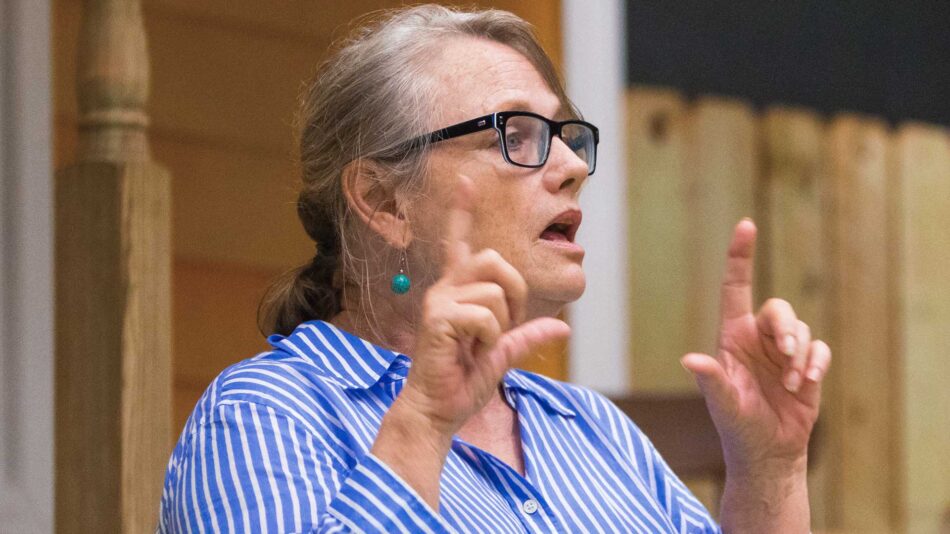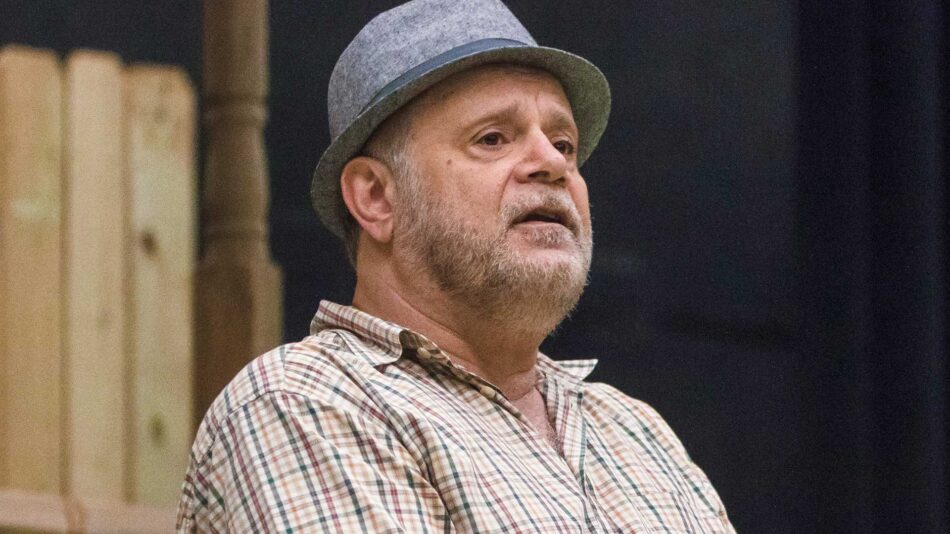
More than 100 students packed into the Craig Hall Balcony Theatre on Sept. 18, 2015, to participate in a question-and-answer session with alumni Tess Harper and Jack Laufer.
The professional actors offered advice on preparing for parts, leveraging talents in a competitive industry and making peace with the turbulence of a career in acting.
Harper, an Academy Award nominee, is known for roles in “Tender Mercies,” “Crimes of the Heart,” “No Country for Old Men” and “Breaking Bad.” She graduated in 1972.
Laufer, who graduated in 1976, also has a significant range of credits, including recent work on “Modern Family,” “Star Trek Into Darkness,” “Masters of Sex” and “Mad Men.”
The crowd had high energy; students posed insightful questions and listened in earnest to the answers.
“(Harper and Laufer) really reinforced many of the things I’ve been discovering and feeling,” senior Morgan Tate said after the panel. “I haven’t been cast a lot in campus productions, and I struggle with confidence sometimes. Hearing that Tess also struggled with those things — that she’s continued to work and find joy in her life, and she’s found success — it was encouraging to know that.”
The actors didn’t sugarcoat the reality of their careers.
“We have no jobs to go back to in L.A., absolutely none,” Laufer said. “You have to be comfortable with being unemployed. … It’s a hard life. But I’m convinced that anybody with tenacity and talent has a place in this business. It might not be the place you originally thought you would be in, but there is a place for you.”
Throughout the session, Harper and Laufer encouraged the students to take advantage of their education at Missouri State.
“This is the starting of a process that you never finish in your whole life,” Harper said. “If you’re lucky, you’ll be curious about everything. You have close to you the tools to find everything much more quickly. All that makes you a better actor, a better citizen and a much more enriched human being.”
Q&A with Tess Harper
After college, Harper moved to Texas and worked with a group called Main Street Theatre. She attended acting workshops and earned parts in commercials and industrial films (films made for corporations) until she landed the female lead opposite Robert Duvall in “Tender Mercies.” She was later nominated for an Academy Award for her supporting role in “Crimes of the Heart.”
What is your favorite memory of being on campus?
The many friends I made here. The times were uncertain, the draft was in effect and we talked about everything. I think the people I met in college are so important in my life because we went through that all together. As an MSU student, I was in Tent Theatre for three years. My favorite play during that time was “Jacques Brel Is Alive and Well and Living in Paris.”
What’s been your favorite role or roles of all time?
Whatever the last part was! I’ve had some great roles, and for me, it’s not just the script. It’s the experience of making it. Playing Rosa Lee in “Tender Mercies” was great. Chick in “Crimes of the Heart” was great. I had a wonderful time working with the Coen brothers on “No Country for Old Men.”
Why is acting your passion?
I fell in love with acting because I fell in love with words. I walked into the theater department and I was home, even though I was afraid to say out loud that I wanted to be an actor when I was in college. It’s all I wanted to do.
What do you think helped you stand out and earn roles in this profession?
I have an odd voice and a distinct look. I got the job in “No Country for Old Men” just so I could listen to that long speech that Tommy Lee Jones gives at the end. On camera, the listener gets their own close-up, and the directors wanted to come in on my eyes.
If you weren’t an actor, what would you be doing?
Acting was the one thing I knew I could be good at. I have a degree in education, and it took me exactly one semester to know I might be OK teaching kids, but I would kill the administration. I’m an anarchist at heart! I know this about myself.
What advice do you have about overcoming self-doubt?
Don’t do anything rash. We all go through that phase of, “I’m no good. The play’s no good. Why did I get involved?” If you have that, please know it is part of the process. Everyone goes through it, maybe not at the same time — because if everybody had it, then the whole production would stop. But you are not alone.
What advice do you have for MSU students considering professional acting careers?
You can’t be an actor if there’s something else you want to do, because it’s too damn hard. If it’s the one and only thing, then it’s a passion, and the best thing you can get out of your whole life is a passion. Find something you love and embrace it. Then, if you fall out of it, find something else to fall in love with.
What’s next for you?
I want time to do things I’ve never given myself time to do — like traveling for the fun of it, or being in the production of “Vanya and Sonia and Masha and Spike.” That would have never have happened if I were waiting for the next TV or film offer. Coming home to do this play, with people I have known and loved for 40 years, this has been a gift to myself — a gift of freedom that came from the drive that propelled me throughout my career.
Q&A with Jack Laufer
Laufer was born in Israel. When he was 5, he and his family immigrated to the U.S. and settled in St. Louis. After graduating from Missouri State, he moved to New York City with $850 in his pocket, and worked odd jobs for a decade while trying to establish himself as an actor. His breakout role came as Eddie in the 1993 movie “Lost in Yonkers.” He has worked steadily since then.
Why did you choose to come to Missouri State?
Honestly, it was what I could afford, but it was fortunate because it’s the best theater school in the state, I believe, and probably in the whole area.
What kind of roles did you have while you were a student here?
When I was a student here, I was a character actor, so I played a lot of older people. I mean, if a college is going to do “Waiting for Godot,” the play’s characters are all older than college-aged. I also played Jesus in “Godspell.” That was great.
How did your Missouri State education prepare you for an acting career?
It gave us a whole foundation and invaluable life experiences to draw from. I had a great education here, and I’m very grateful for it. When I was a student, I wanted to make a living as an actor and that’s what I am — a blue-collar, working-class actor. And I’ve been lucky enough to make my living playing guest stars, supporting parts in films, commercials, whatever. You put them all together, and there’s a career there.
Why is acting your passion?
I truly don’t know how to do anything else — not that anyone would pay me for. I can do a one-pot meal, but there’s not a lot of call for that. Honestly, I couldn’t even think about doing anything else, and that’s the only reason you should go into this business. If you love doing something else, I say do it, because this is a really hard life.
What were some challenges you faced when you were starting out?
When I moved to New York City in 1977, there wasn’t much work for 20-somethings. It was all roles as young parents or somebody in their 30s. It’s completely different now. They’re hiring young people and building the rest of the cast around that. I’m happy to just play a grandpa, maybe even a dad.
What is an example of a difficult role you played?
I was intimidated doing “Lost In Yonkers.” I did OK in the audition, but this was very early on in my film career. I had to work with Irene Worth. That intimidated me, and she knew it. Before the camera started rolling, she and I started an improv. The director was very smart and turned on the camera, and it turned out that was the take we used.
How did you make yourself stand out to get the roles you’ve played?
With the big parts that I’ve gotten, I’ve had some history that I can bring to my auditions. My mother was a Holocaust survivor and (Nazi officer) Adolf Eichmann visited her camp every day. So I was able to bring my family history to the audition for my role in “The Man Who Captured Eichmann.” You have to know yourself well enough to expose yourself and not be ashamed. I think that’s what the best actors do.
What advice do you have for MSU students considering professional acting careers?
Diversify yourself as much as possible. It’s much harder to make a living now than it was when I started. You have to be a voice actor. You have to be a commercial actor. You have to be interested in all aspects of the business.
What’s next for you? Do you have any roles lined up?
Nothing. But that’s the life of an actor. You don’t know until it happens, and you have to be OK with that.




Leave a Reply